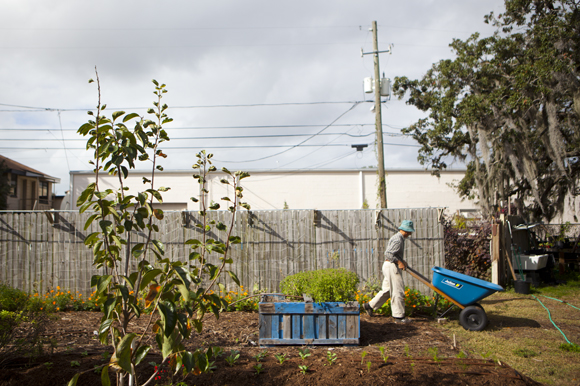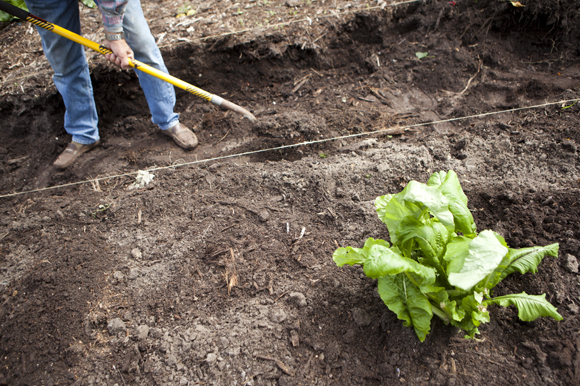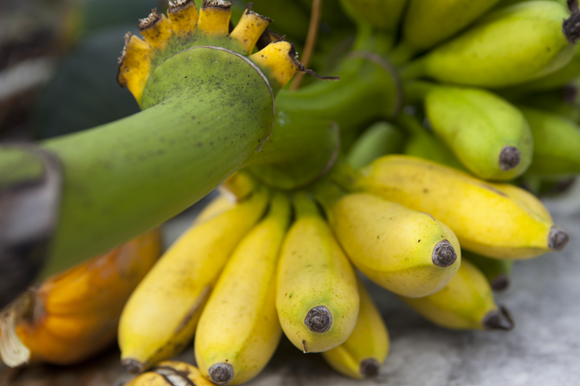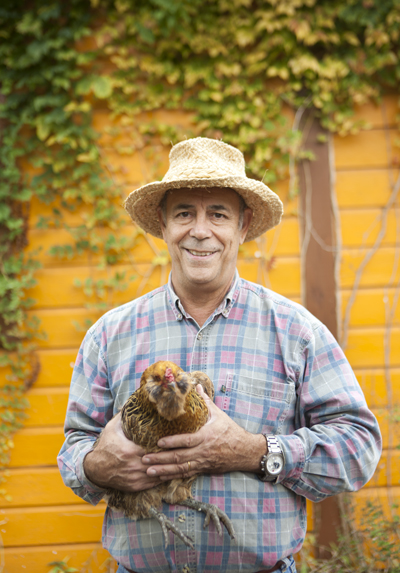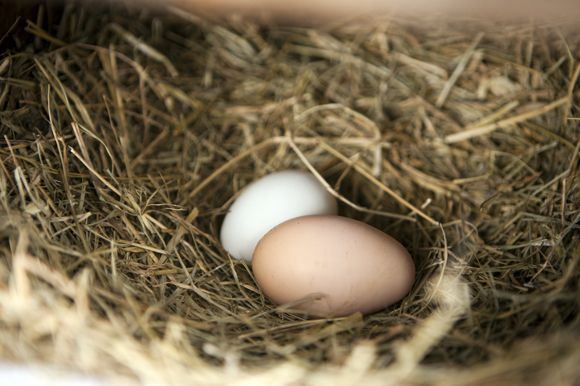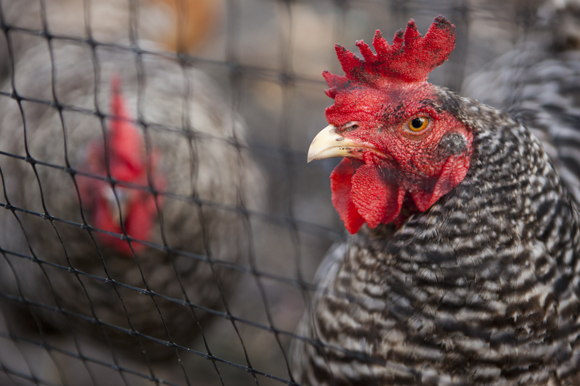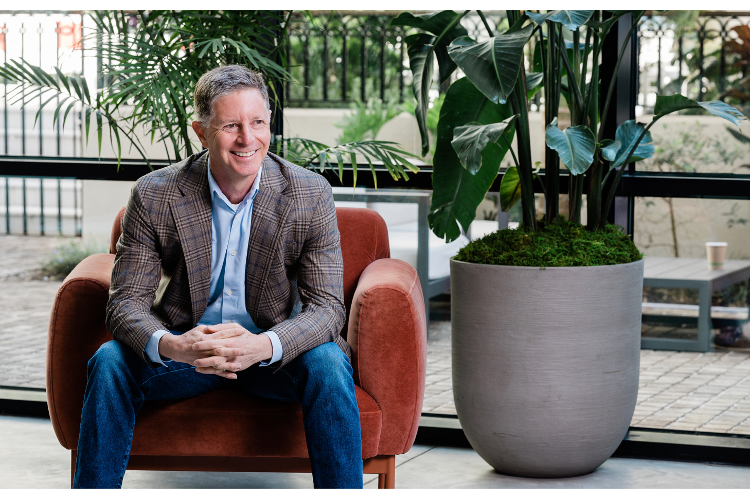Fresh Greens, Anyone? Urban Gardens Sustain Communities
Urban gardens sponsored by community groups, churches and neighborhoods have caught on like wildfire in St. Petersburg as local residents pursue the idea of sustainable agriculture, small urban farms and healthier eating.
Fourth- and fifth-grade boys from Campbell Park Elementary School come running down the sidewalk at full speed, eager to work in the garden they’ve been tending under the guidance of Kip Curtis, executive director of the Edible Peace Patch Project, and volunteers from local colleges.
“I think it’s fun to come out and do gardening; it’s a good experience for me,” says Tyrone. “I wish I could do this every day,” says Davion. The boys point out the leafy greens sprouting from heavily mulched beds, a surprising variety of carrots, cucumbers, collards, lettuce, pineapples, turnips, tomatoes, arugula and mustard greens.
“We’re growing a garden here, but we’re integrating it with academics, both lessons and mentoring,” says Curtis, a former environmental sciences professor at Eckerd College who is now working fulltime with the Edible Peace Patch Project, a 501c3 nonprofit organization that he founded a few years ago.
The lessons are experiential and fun. To teach what Curtis calls food literacy, his team partnered with All Childrens Hospital for a class in healthy eating using produce harvested from the garden. At a recent Saturday Morning Market in downtown St. Petersburg, the kids learned about entrepreneurship when they manned a table and sold some of their harvested produce to local shoppers.
The garden at Campbell Park is one of four that the Edible Peace Patch Project has sponsored at Pinellas County Title 1 schools in South St. Petersburg since 2009. An additional four more are expected to be in place by the end of 2014.
But school gardens are just the start of Curtis’s vision. He wants to create an urban agricultural social enterprise that he hopes will be a model for the nation.
Community Redevelopment
Through the Edible Peace Patch Project, Curtis is negotiating to buy 15 acres in south St. Petersburg. The land would support a sustainable farm in an impoverished part of the county. Curtis envisions a thriving commercial production with produce from the urban farm and school gardens sold to schools and other organizations, giving students and adults access to healthier food choices.
But it’s not just about growing food, says Curtis. He expects to create an educational component that brings youth offenders to the farm, helping them earn their GED, learn new skills and get their lives back on track.
There will also be a major emphasis on entrepreneurship, he says, with the expectation of spinning off small agriculture-related businesses. “Small businesses are the wave of the future,” says Curtis. “This is about building a sustainable community in an impoverished part of the city. At the heart of this project is the idea of community revival.”
“The food economy is huge and we hope to create a farm-to-table food system that addresses a variety of issues,” says Curtis.
The farm’s LEED-certified main building, which will house classrooms and food preparation areas, will feature the latest in green technology, such as solar panels and composting toilets. Plans also call for the campus to serve as a demonstration site for wind turbines, rainwater harvesting and aquaponic areas.
An Urban Oasis In The Heart Of Downtown
Three years ago, the Faith House, a transitional living facility for people recovering from alcohol or drug abuse, had about a half-acre of vacant land. Emmanuel Roux and Bill Bilodeau, local champions of sustainable urban agriculture, were on the lookout for a plot of land that could support a demonstration site for a large garden.
Today, that half-acre of land in the heart of St. Petersburg’s urban core has been transformed. Fennel, beets, pole beans, basil, tomatoes, broccoli, collards and more are growing in long trenches watered with drip irrigation. Tropical trees like papayas, loquat, limes, star fruit and avocado are thriving. Scraps of wood from boat docks and pallets have been repurposed as tool sheds, while donated bricks were turned into a courtyard event space for gardening classes. Several rabbits and a few dozen chickens live there, too.
“It’s not rocket science, you just need to get it started,” says Roux, who grew up farming in Tunisia, studied hotel management in Switzerland and landed in St. Petersburg in the 1990s. At one time, he owned the Garden Restaurant and then the Redwood. Now he sells decadent, organic, gluten-free chocolate cake at Gateau O Chocolat and is a vocal advocate for locally grown, fresh food.
Bilodeau had a career as a professional gardener on big estates in Long Island, New York, before moving to St. Petersburg and starting up a landscape design business. He’s a former president of the Pinellas Chapter of the Florida Native Plant Society and a founder of Gaia’s Guardians, a passionate collective of local gardeners who support the concept of permaculture, a philosophy that embraces sustainable living, natural ecosystems and small carbon footprints.
The Faith House is an example of a permaculture demonstration site, says Roux. It’s about working with nature instead of against it, he says.
Most of the produce and the eggs from the Faith House garden go to feed residents of the transitional living facility, but a small portion is sold online through Nathan and Tina Levy’s StPete.LocallyGrown, a local online co-op that matches local growers and buyers who value chemical-free locally grown food.
The Levys, who were featured in the January 15, 2013 issue of 83 Degrees Media, recently set up a Pinterest page for the burgeoning number of St. Petersburg’s local urban gardeners to post their photos.
More Urban Gardens
One of St. Petersburg’s oldest community gardens — the Oakdale Community Garden — is located near the quaint Driftwood neighborhood, just south of downtown. Ten local families established the 7,000-square-foot garden in 2009. Faith Covenant Church, in the northeast section of the city, also sponsors a community garden, which offers a portion of its proceeds to homeless shelters and other charitable groups.
The Pinellas Pioneer Garden, a combination education and demonstration garden, sits on city-owned land near the Boyd Hill Nature Preserve at the Pinellas Pioneer Settlement. Tours are offered by appointment.
“Our primary focus is to raise awareness about how to successfully grow organic vegetables and fruit,” says Ray Wunderlich III, who volunteers his time to manage the garden. “We have about 25 volunteers during the growing season. We also have companies like Valpak volunteering to spend a day with us and we have kids coming through as part of summer camp. The Girl Scouts are coming in January for an educational workday.”
The majority of the garden’s harvest goes to local charities like the St. Vincent de Paul food pantry for the needy.
In addition to their hands-on work in the garden, Wunderlich, Roux and Bilodeau are active members of the Sustainable Urban Agriculture Coalition of St. Petersburg (SUAC).
Established in 2011 through a grant from Bon Secours Health System, along with support from the St. Petersburg Area Chamber of Commerce, SUAC represents a diverse coalition of local gardeners who hope to make Tampa Bay a model for urban agriculture.
This year the group has been working with the city to amend the community gardens ordinance to expand urban agriculture within city limits and allow for small-scale urban farming to promote growing food locally and to serve as an economic stimulus.
A SUAC initiative called, “10,000 greens,” launched in 2012 with a commitment to plant and donate greens in impoverished neighborhoods. On the Martin Luther King Jr. Day of Service on January 20, 2014, the group will be donating greens to daycare centers, churches and social service agencies.
Janan Talafer is a freelance writer in St. Petersburg, FL, who shares a home office with her dog Bear and two cats Milo and Nigel. Comments? Contact 83 Degrees.

